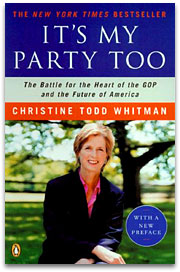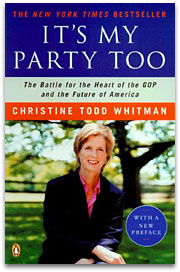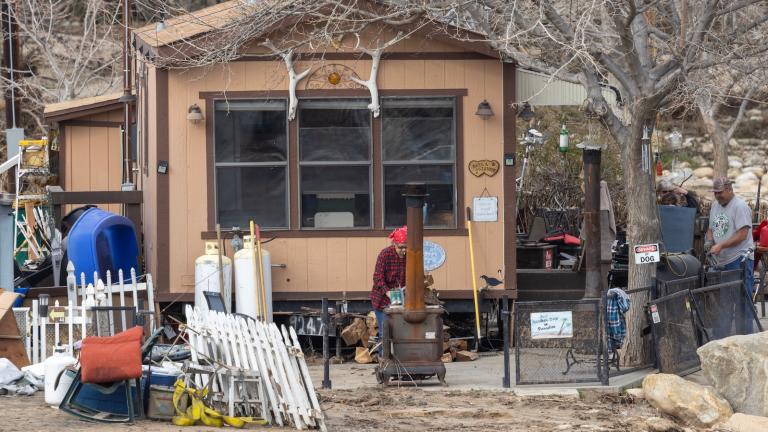If Christine Todd Whitman had waited four years to publish her political memoir, she might have had this winter’s timeliest bestseller.
The former Environmental Protection Agency administrator and New Jersey governor wrote It’s My Party Too: The Battle for the Heart of the GOP and the Future of America to urge moderate Republicans, environmentalists included, to reclaim the party from social ideologues and “extremists.” She warned that focusing on hot-button social issues might bring short-term political payoffs but would end up marginalizing the Republican Party in the long run.
The message sounds like simple common sense in the wake of the 2006 and 2008 elections, in which the GOP lost first Congress and then the White House. But Whitman published the book in January 2005, right as George W. Bush prepared for his second inauguration. Republican leaders were hardly in the mood for soul-searching and largely laughed her off.
I called her recently to ask if she wanted to say, “I told you so.”
She declined: “That’s no satisfaction when you see how badly the party has done. It’s time for a real rethinking of where the Republican Party is going.”
Did she wish she had waited to publish until this fall, when the book might have found a more receptive audience?
“No,” she said. “Now it would just be what everybody is seeing. The message was trying to head this off. You could see this coming, given previous results and just knowing the American people. The point was trying to wave a red flag and say, ‘Don’t get too complacent.'”
Whitman’s position as a moderate Republican means she’s never been at home among the far right nor the environmental left. Her brief tenure as Bush’s first EPA administrator could be described as an attempt to mediate between those two camps. She resigned in frustration just over two years after being sworn in.
The experience at EPA gives her a unique vantage for sizing up the challenges Barack Obama will face in engaging Republicans on energy and climate issues. She doesn’t expect the new administration to pass climate-change legislation as quickly as greens are hoping, though she said there’s plenty of room for progress through stepped-up enforcement from the Obama EPA.
“I would suspect they’ll take action through regulation first, and then go for legislation later on, once they’ve got their stimulus package done and some of those other things done,” she said.
Whitman also offered advice on industry regulation: “The key is not to overreach. Obama is going to be under a lot of pressure to undo everything that’s come before [during the Bush administration] and to take the most aggressive stance on the environment. They’ll do better if they can look for ways to work proactively with the private sector.”
Such language explains, in part, why environmentalists have never considered her one of their own. As governor of New Jersey from 1994 through 2000, Whitman helped decrease violations of clean-air and clean-water rules in the state, developed an open-space preservation program, and received praise from the Natural Resources Defense Council for her beach-monitoring system. But she also cut the state’s environmental-protection budget by 30 percent.
When Bush selected her as his first EPA chief in January 2001, national environmental groups saw her as the best they could hope for in what was taking shape as a decidedly un-green administration.
But Whitman learned quickly that Bush’s inner circle planned to limit her work. She defended Bush’s campaign promise to cap carbon emissions, then watched the White House reverse that position two months into his term. She traveled to Trieste, Italy, to work on Kyoto Protocol negotiations, but returned to find out that the president had decided not to support the treaty.
“It happened pretty fast,” she said. “It came to a point where we stopped being able to get much done.”
She resigned in spring 2003, offering the familiar explanation of needing “more time with family.” But by the end of Bush’s first term she was ready to acknowledge her conflicts with the White House. She now runs the Whitman Strategy Group, a business consulting firm that specializes in government relations and environmental and energy issues. In 2006, she also took a job talking up nuclear power.
At the EPA, she expects the Obama administration will find a wave of retiring scientists who have been with the agency since its first years in the early 1970s. She said the agency’s low morale has undermined efforts to recruit new talent. Even with a more supportive president, she said the agency faces plenty of limits.
“It’s more constrained than I realized, even as a governor who worked closely with the agency,” she said. “Because it is a regulatory agency, Congress has set a lot of the rules. When you try to be flexible and impose some common sense on some things, you get hauled into court and it gets very frustrating.”
Whitman knows a number of environmentalists have written her off for toeing the Bush-administration line too willingly while at the EPA, or for enabling some of its worst industry-pandering excesses. She maintained there’s a need to give businesses some breathing room on pollution controls.
“You need to have regulations, standards, and enforcement,” she said. “But you can get much better results if you can engage the creativity of the private sector, if you can bring them in and understand that they do need to make a profit.”
Given Obama’s insistence that he wants a bipartisan Cabinet, would she be willing to return to EPA if asked? No, Whitman said — not that she expects to be asked. “I don’t believe in going back to a job I’ve moved on from. I think that would be a mistake.”
Whitman said she’s hearing that Lisa Jackson, the former commissioner of New Jersey’s Department of Environmental Protection, is a top contender to be Obama’s EPA administrator. Jackson is currently heading up the president-elect’s EPA transition effort. “I hope that’s true, because I think she’d be good at it,” Whitman said.
Whitman’s larger concern lately is saving her own party. She kinda said “I told you so” in a recent Washington Post op-ed. She’s also pushed the party to reclaim its environmental heritage, noting that Republican presidents founded the National Parks system, signed into law the Clean Air and Clean Water acts, and even created the EPA.
Finding more ways to attract voters than campaigning against gay marriage, abortion, and stem-cell research is crucial to the party’s relevancy, Whitman said.
“This election showed pretty clearly that the majority of the American people are in the center,” she said. “Self-identified Christian Republicans voted in numbers we haven’t seen before. There were almost 2 million more of them than what voted for George Bush in 2004. So they came out. They voted. And we got hammered because there aren’t enough of them.
“The lesson should not be that we don’t want them — of course we want them, we want everybody. But they’re not enough. [If] we continue to narrow the scope of the party, of what you have to believe to be a good Republican, we’re going to end up on the sidelines every time.”




